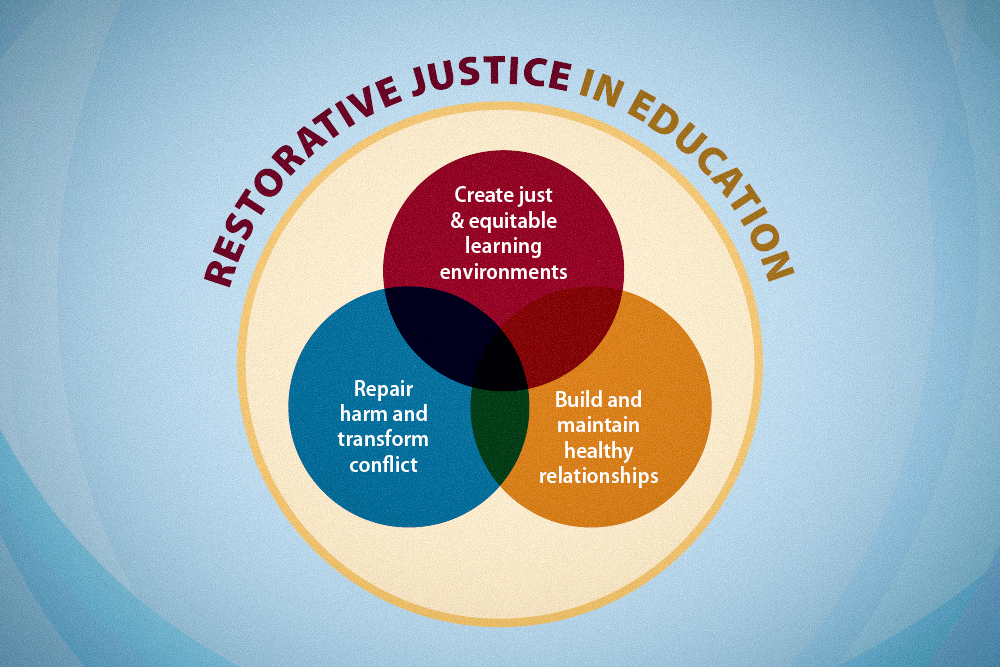Beginning in fall 2021, Eastern Mennonite University’s MA in Education: Restorative Justice in Education degree program will offer an online option, in addition to the current curriculum on the Harrisonburg campus. The new virtual learning opportunity comes both in response to the pandemic and a desire to expand the program’s reach to include educators who live outside of the Shenandoah Valley.
“When we offered the annual RJE Conference in a virtual format in June 2020, we immediately realized these benefits as participants from places like Chicago said they would have never been able to travel to Virginia to join us,” said Professor Paul Yoder, director of EMU’s Graduate Teacher Education program.
The virtual conference drew in over 200 people from 25 states and three countries besides the U.S. – almost twice as many participants as came to the in-person conference in 2019.
“We recognize that another benefit of hosting events online is that we reduce our carbon footprint for those who would have traveled but are now a click away,” Yoder said.
Professor Kathy Evans said she’s excited by the prospect of working with more and more educators that can’t make the trek to EMU’s campus.
“I really love working with our local educators in the Shenandoah Valley. I have learned a lot from them and we have been able to grow together. Because EMU is a smaller institution, we’re nimble, and so it enables us to work with our grad students in ways that make sense for them,” Evans said. “This online option means being able to also sit in Circle and grow with restorative justice educators beyond Harrisonburg, beyond Rockingham County.” [Read more about the Circle Process.]
More learning opportunities
Join educators and practitioners at the 2021 RJE Conference, which will take place virtually June 22 and 23. David Yusem, the restorative justice district coordinator at Oakland Unified School District in California, will be the keynote speaker.
Additionally, Kathy Evans will be speaking at the 2021 Relational Schools virtual conference April 11 – 21.
The master’s degree in education with a focus on restorative justice education is offered through EMU’s Graduate Teacher Education program. The program also offers a graduate certificate in restorative justice in education, and EMU offers a master’s degree in restorative justice through the Center for Justice and Peacebuilding.
A few structural changes have accompanied the online shift. Previously, the program included one-week summer intensive courses, which now will be held in half-day sessions over two weeks to prevent Zoom fatigue “while maintaining rich and immersive engagement,” Yoder explained. They’ll also draw on EMU’s hefty toolbox of online instructional resources, including software like VoiceThread, to facilitate asynchronous communication.
One challenge of the online model is preserving the quality of connection and interaction that have been intrinsic to restorative justice programming at EMU since Professor Howard Zehr, a groundbreaker in the movement, joined the Center for Justice and Peacebuilding faculty in the 90s.
“Restorative justice (RJ) at its core is relational,” Evans said. “We can’t sacrifice the relational aspect of it just because we changed contexts. And I think that that’s a principle that transcends online versus face to face contexts. That’s a principle that’s important whether you’re in a first grade class, a college class, community development circle, or a juvenile justice circle.”
Evans said that the online format does require “a greater level of intentionality,” because it’s easier to be distracted on a computer than in a physical circle with your classmates. That intentionality takes the form of opening and closing rituals to circles, and having participants identify their distractions and develop shared expectations about how they will stay focused.
She also noted that a commitment to justice and equity have to be at the heart of any restorative justice program or work, down to the logistics of a class.
“I think having a new context, i.e. online, requires us to specifically identify what justice and equity look like in an online format. What needs to happen to ensure that those things are evident?” Evans said.
For example, some students may have internet connectivity issues, which then become an equity issue in an online class. Evans recalled a recent circle where a participant had some audio instability, even when they kept their camera off to preserve bandwidth. But the class discovered that this participant could keep their camera and mic on if the rest of the class muted themselves and turned off their cameras.
Evans said that was a “beautiful analogy about stepping aside so that silenced voices can be lifted up. It was a lovely moment … this is what we need to do.”
